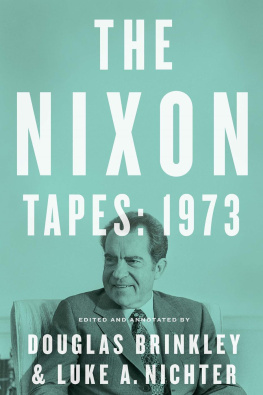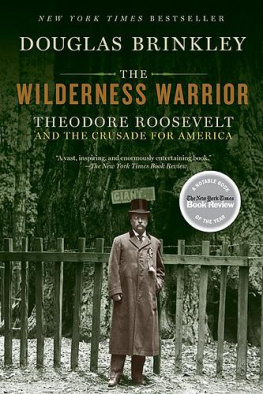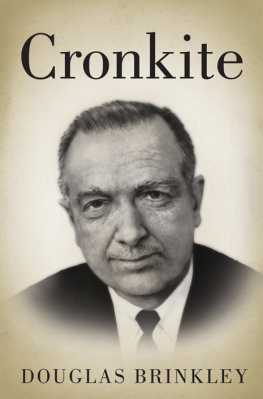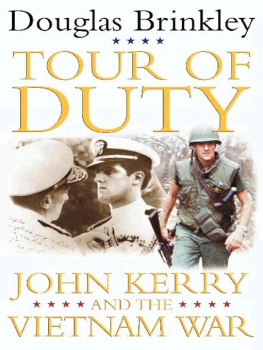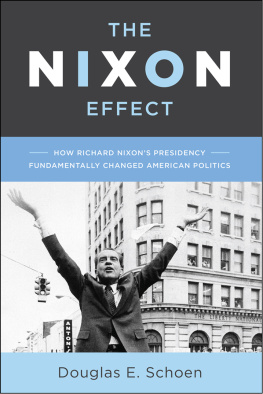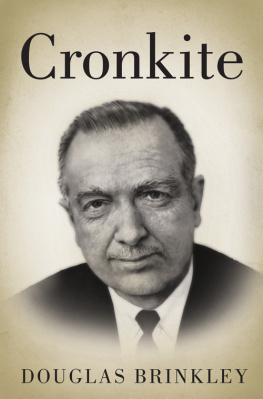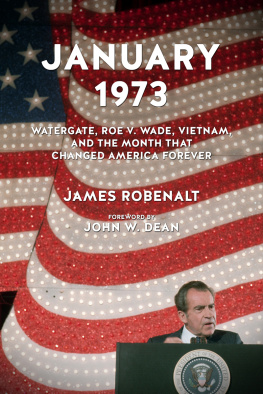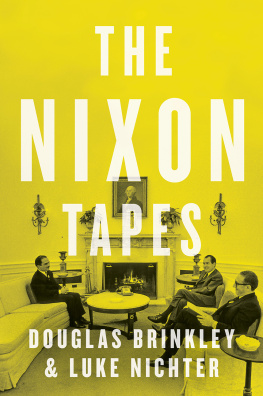Douglas Brinkley - The Nixon Tapes: 1973
Here you can read online Douglas Brinkley - The Nixon Tapes: 1973 full text of the book (entire story) in english for free. Download pdf and epub, get meaning, cover and reviews about this ebook. year: 2016, publisher: Mariner Books, genre: Detective and thriller. Description of the work, (preface) as well as reviews are available. Best literature library LitArk.com created for fans of good reading and offers a wide selection of genres:
Romance novel
Science fiction
Adventure
Detective
Science
History
Home and family
Prose
Art
Politics
Computer
Non-fiction
Religion
Business
Children
Humor
Choose a favorite category and find really read worthwhile books. Enjoy immersion in the world of imagination, feel the emotions of the characters or learn something new for yourself, make an fascinating discovery.
- Book:The Nixon Tapes: 1973
- Author:
- Publisher:Mariner Books
- Genre:
- Year:2016
- Rating:5 / 5
- Favourites:Add to favourites
- Your mark:
- 100
- 1
- 2
- 3
- 4
- 5
The Nixon Tapes: 1973: summary, description and annotation
We offer to read an annotation, description, summary or preface (depends on what the author of the book "The Nixon Tapes: 1973" wrote himself). If you haven't found the necessary information about the book — write in the comments, we will try to find it.
The Nixon Tapes: 1973 — read online for free the complete book (whole text) full work
Below is the text of the book, divided by pages. System saving the place of the last page read, allows you to conveniently read the book "The Nixon Tapes: 1973" online for free, without having to search again every time where you left off. Put a bookmark, and you can go to the page where you finished reading at any time.
Font size:
Interval:
Bookmark:
Compilation and annotation 2015 by Douglas Brinkley and Luke A. Nichter
ALL RIGHTS RESERVED
For information about permission to reproduce selections from this book, write to Permissions, Houghton Mifflin Harcourt Publishing Company, 215 Park Avenue South, New York, New York 10003.
www.hmhco.com
Library of Congress Cataloging-in-Publication Data is available.
ISBN 978-0-544-61053-8
Cover design by Patrick Barry
Cover photograph AP Photo: President Richard M. Nixon on his sixtieth birthday, at the White House, January 9, 1973
e ISBN 978-0-544-63333-9
v1.0915
For two special daughters,
Benton Brinkley and Ava Anne Nichter
On January 20, 1973, Richard Nixon was inaugurated for his second term as U.S. president. Speaking in front of twenty thousand spectators and tens of millions of TV viewers, the sixty-year-old Nixon was on top of the world. There was something for everybody in the inaugural speech. For antiVietnam War liberals, Nixon spoke about being on the threshold of a new era of peace. Conservatives were treated to a line that anticipated the Reagan Revolution: Government must learn to take less from people so that people can do more for themselves. Nixon, having trounced George McGovern in the 1972 election by a margin of 520 electoral votes to 17, even brazenly appropriated the most celebrated phrase from President John F. Kennedys 1961 address and made it his own. In our own lives, let each of us ask not just what will government do for me, Nixon said, but what can I do for myself?
Although the euphoric Nixon was hatless on his inauguration day and the temperature was in the low forties, storm clouds were gathering in the distance. Just twelve days earlier the trial of the five burglars arrested at the Watergate offices of the Democratic National Committee, as well as two accomplices, had begun. All of Nixons men were under legal duress. Howard Hunt pleaded guilty on January 11. Only four days later Bernard Barker, Frank Sturgis, Eugenio Martinez, and Virgilio Gonzalez did the same. That was the beginning of the end for the Nixon administration; the investigation would intensify further over the next eighteen months, consuming everything in its path. As The Nixon Tapes: 1973 demonstrates, the president, before his second term ever began, was hostage to the Watergate crisis.
Nixons fall from grace has been referred to as a Shakespearean tragedy. Because Gerald Ford pardoned Nixon, we may never learn the full truth of Watergate. Yet it is unlikely that Nixon could have gone to trial, whether in the Senate or as a result of a later criminal or civil case. Classified information would have had to be made public, which would have been unacceptable to the CIA, FBI, NSA, and other government agencies. Nixon had to be pardoned.
A Nixon show trial would also have been damaging to the presidency as an institution. After Harry Trumans death in December 1972 and Lyndon Johnsons a month later, Nixon went through Watergate alone. While Nixons predecessors would not have defended abuses of power, they could have launched a bipartisan defense of the presidency, executive privilege, and Nixons secret tapes. After all, Nixons predecessors had also secretly taped, and their tapes remained their personal property, just as Nixon had expected his tapes to remain when his system was installed.
But because of Fords act there was no trial. Instead, there was a series of proxy trials for the rest of the 1970s, the most significant being the Church Committee and U.S. v. Gray, Felt, Miller. These proceedingsduring which virtually every living high-ranking figure testifiedfocused on a quarter-century of abuses of governmental power, including assassinations of foreign leaders, wiretapping, domestic surveillance, and illegal invasions of Americans privacy. As of this publication, despite numerous Freedom of Information Act requests, the Church Committee records remain sealed.
When listening to the Nixon tapes of 1973, it is impossible not to hear growing paranoia in the presidents voice. Nixons greatest downfall, in fact, was his lack of trust in subordinates. If he had had a more trustworthy staff, he wouldnt have created the White House Plumbers Unit, which set him apart from the opposition research teams of Kennedy and Johnson. If Nixon had simply used the FBI, CIA, and NSA the ways his predecessors had, his tally of law-breaking offenses wouldnt have been so substantial. Indeed, his lack of trust in those three national security agencies led directly to the creation of the Plumbers on his authority, derived from the Huston Plan (which had been created by the leaders of the FBI, CIA, and NSA in coordination with the White House).
Even with the publication of this volume many mysteries regarding Watergate remain unsolved more than forty years later. Who ordered the break-in? What were the burglars looking for? Why did so many have FBI or CIA backgrounds? Ideally in the coming years, a large number of the remaining Nixon tapes, as well as other records currently restricted from public access, will finally become available. Judge John Sirica tried to get answers to some of these questions, getting to motive, but in one case the testimony of the governments star witness, Al Baldwin, remains sealed. The question will arise, undoubtedly, Sirica said, what was the motive for doing what you people say you did.
One of the great tragedies revealed in this book is the refusal of Dean Mitchell, Haldeman, and Ehrlichman to level honestly with Nixon following the break-in when the crisis was still manageable. The White House staffs instinct was to keep details from Nixon in order to protect him, but they ended up fatally wounding his presidency. Nixon should have put his advisors in a White House conference room and told them to reveal the complete story of the Watergate break-in. Instead, as is made clear in this book, the first time Nixon did this was March 22, 1973, and by then everyone was turning on each other. By April, every major White House figure had a defense attorney, and many were cooperating with the prosecutors.
From the final batch of Nixon tapes released by the National Archives in August 2013, featured in this book, it is abundantly clear that the Watergate break-in was part of a much larger coordinated effort related to domestic intelligence. This effort was based on the Huston Plan, a forty-three-page report that was cobbled together by an ad hoc committee formed from the intelligence agencies and chaired by J. Edgar Hoover. Thanks to Edward Snowden, we know more about NSA abuses of power today than in the Nixon era. The Huston Plan and related correspondence remain classified as Top Secret.
An overall impression this book offers is that Nixon didnt really care about Watergate, since he wasnt directly involved in the break-in or the planning of it. But he cared an awful lot about what Watergate might uncoverand almost did: the seventeen Kissinger/Haig wiretaps beginning in 1969 designed to stop leaks related to U.S.-Soviet arms talks; the Huston Plan; and the military spy ring overseen by Joint Chiefs of Staff chairman Thomas Moorer, which uncovered a pattern of thefts of highly classified documents from Henry Kissingers briefcase. The full details of these remain classified today and involve the most top-secret levels of the intelligence community. Nixon alluded to their importance in his 1975 grand jury testimony, which was made public only in November 2011.
In 1973 historian Arthur M. Schlesinger Jr. published his classic The Imperial Presidency, warning of an Executive Branch run amok, willing to shred the Constitution in order to acquire power. What Nixon most worried about being uncovered during the Watergate crisis of 1973 was not his high crimes and misdemeanors, or even the imperial presidency itself, but a kind of shadow governmentsimilar to President Dwight D. Eisenhowers military-industrial complexa partnership between the White House and intelligence agencies that had been growing since the beginning of the Cold War, nurtured by leaders of both political parties.
Next pageFont size:
Interval:
Bookmark:
Similar books «The Nixon Tapes: 1973»
Look at similar books to The Nixon Tapes: 1973. We have selected literature similar in name and meaning in the hope of providing readers with more options to find new, interesting, not yet read works.
Discussion, reviews of the book The Nixon Tapes: 1973 and just readers' own opinions. Leave your comments, write what you think about the work, its meaning or the main characters. Specify what exactly you liked and what you didn't like, and why you think so.

